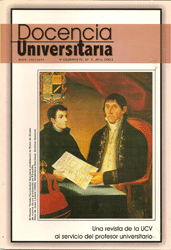Pensamiento del Docente, Estrategia Instruccional y Resultados Educacionales en una Sociedad en Transición
Palabras clave:
pensamiento docente, estrategias instruccionales, educación del futuro, educational thought, Instructional strategies, education for the futureResumen
En este trabajo se discute la relación que existe entre el pensamiento del docente, las estrategias instruccionales y los resultados educativos. Se parte de un marco conceptual derivado de la psicología cognitiva (Clarck y Peterson, 1990) y de la teoría organizacional (Schön, 1998). Clarck y Peterson plantean la importancia de los procesos de pensamiento del profesor, su relación con las acciones didácticas y sus efectos observables; mientras que Schön destaca la relevancia de la reflexión crítica del docente sobre su práctica. Se clarifica la base teórica del pensamiento docente en la modernidad y la postmodernidad y se analiza la orientación que debería tener la educación del futuro. Se describen algunos de los elementos que deberían ser considerados en el diseño curricular para la época de transición en la que estamos viviendo y se discute el rol de las estrategias instruccionales en el logro de los objetivos de aprendizaje. Se concluye en que la adecuación de la educación a las exigencias de calidad, flexibilidad, practicidad, relevancia y trascendencia en el aprendizaje que demandan los nuevos tiempos está directamente relacionada con el alcance de la visión del docente, sus modelos mentales y su posibilidad de reflexión sobre y desde la práctica profesional.
Abstract
In this work, the existing relationship between the teacher’s thought, the instructional strategies that he/she applies and the instructional outputs is discussed. The discussion departs from a conceptual framework derived from the cognitive psychology (Clarck and Peterson, 1990) and from the organizational theory (Schön, 1998). Clarck and Peterson emphasize the importance of the teacher’s processes of thought as well as his/her relationship with the didactic actions and their observable effects; whereas Schön emphasizes the relevancy of the critical reflection of the teacher on his/her practice. The theoretical base of the educational thought in the modernity and the post modernity is clarified, and the orientation that should have the education for the future is analyzed. Besides, some of the elements that should be considered in the curriculum development for the epoch of transition in which we are living are described and the role of the instructional strategies in the achievement of the learning aims is discussed. It is concluded that the adequacy of education to the requirements of quality, flexibility, practicity, relevancy and transcendence in the learning that the new times demand is directly related to the scope of the teacher’s vision, his/her mental models and his/her possibility of reflection on/and from the professional practice.


